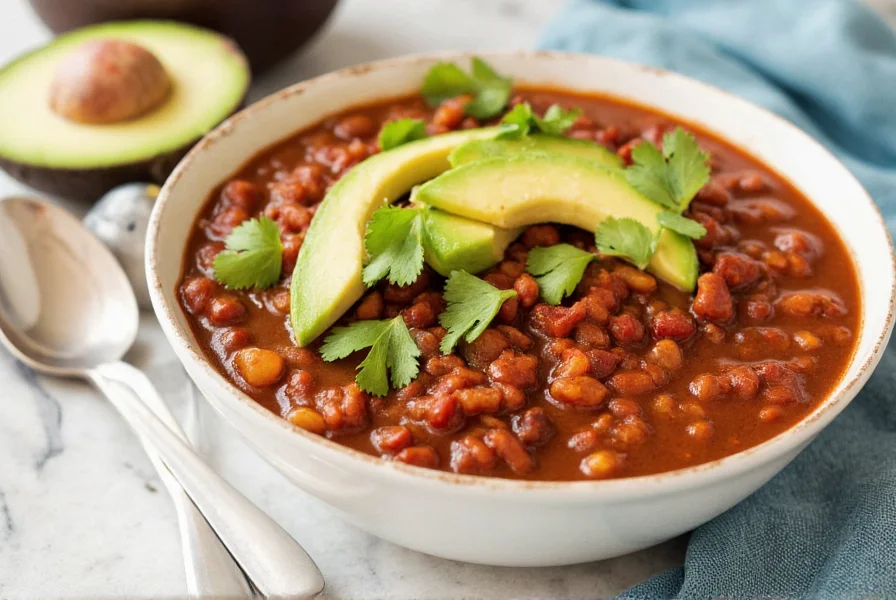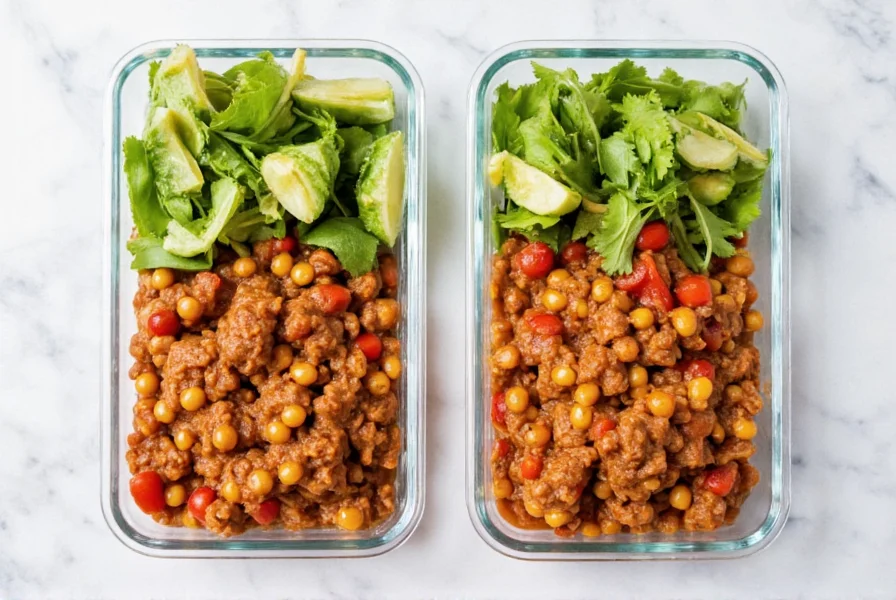Creating a delicious carb friendly chili requires understanding where carbohydrates hide in traditional recipes and implementing smart substitutions that maintain texture and depth of flavor. The key is focusing on high-quality proteins, non-starchy vegetables, and strategic use of spices to compensate for eliminated ingredients. This approach delivers a satisfying meal that aligns with various dietary goals while providing essential nutrients.
Understanding Carbohydrates in Traditional Chili
Standard chili recipes often contain 25-35 grams of carbohydrates per serving, primarily from three sources: beans, tomatoes with added sugar, and sometimes corn or other thickeners. For those managing diabetes, following a keto diet, or reducing carbohydrate intake for weight loss, these levels can disrupt dietary goals. The good news is that with thoughtful ingredient swaps, you can create a flavorful chili with just 8-12 grams of net carbs per serving.
Essential Ingredient Substitutions for Low Carb Chili
The foundation of successful carb friendly chili lies in strategic replacements that maintain texture and flavor complexity. Here are the most effective swaps:
| Traditional Ingredient | Carb Content (per cup) | Low Carb Alternative | Carb Content (per cup) |
|---|---|---|---|
| Beans (kidney, pinto) | 40g net carbs | Mushrooms, eggplant, or extra ground meat | 5-7g net carbs |
| Sweetened tomato products | 10-15g net carbs | Sugar-free tomato sauce or crushed tomatoes | 6-8g net carbs |
| Corn or masa thickener | 20-25g net carbs | Grated zucchini or xanthan gum | 3-4g net carbs |
Perfecting Flavor Without Carbs
Many worry that removing beans and sugar will compromise chili's signature taste, but professional chefs use these techniques to enhance flavor in carb controlled chili:
- Umami boosters: Add a tablespoon of fish sauce or soy sauce (both low-carb) for depth without sweetness
- Smoky elements: Use chipotle peppers in adobo sauce instead of sugar-laden smoked paprika
- Acidity balance: Replace sugar with a splash of apple cider vinegar to cut through richness
- Texture replacement: Finely diced mushrooms provide meaty texture similar to beans
Simple Carb Friendly Chili Recipe
This diabetes friendly chili recipe serves 6 and contains approximately 9g net carbs per serving. Preparation time: 15 minutes. Cooking time: 45 minutes.
Ingredients
- 1.5 lbs lean ground turkey or beef
- 1 large yellow onion, finely diced
- 1 bell pepper, any color, finely diced
- 8 oz cremini mushrooms, finely chopped
- 28 oz sugar-free crushed tomatoes
- 15 oz tomato sauce (no sugar added)
- 3 cloves garlic, minced
- 2 tbsp chili powder
- 1 tbsp cumin
- 1 tsp smoked paprika
- 1 chipotle pepper in adobo, minced
- 1 cup grated zucchini (squeezed dry)
- Salt and pepper to taste
Instructions
- Brown the ground meat in a large pot over medium-high heat, breaking into small pieces
- Add onions, bell pepper, and mushrooms; cook until vegetables soften (about 8 minutes)
- Stir in garlic and all spices; cook for 1 minute until fragrant
- Add crushed tomatoes, tomato sauce, and chipotle pepper; bring to a simmer
- Stir in grated zucchini and simmer uncovered for 30 minutes, stirring occasionally
- Season with salt and pepper; serve with optional toppings

Nutritional Benefits Beyond Carb Reduction
A well-constructed carb friendly chili offers multiple health advantages beyond reduced carbohydrate content. The increased vegetable content boosts fiber intake, which helps regulate blood sugar levels. Higher protein content from lean meats promotes satiety, reducing overall calorie consumption. The elimination of added sugars supports better metabolic health, while the abundance of spices like chili powder and cumin provide anti-inflammatory benefits. This makes high protein low carb chili particularly valuable for those managing type 2 diabetes or pursuing sustainable weight loss.
Customizing for Specific Dietary Needs
One of the strengths of this adaptable recipe is its ability to accommodate various dietary requirements while maintaining low carb credentials:
- Keto version: Increase healthy fats by adding 1/4 cup avocado oil when sautéing vegetables and topping with sliced avocado
- Diabetes management: Add 1 teaspoon cinnamon to help regulate blood sugar response
- Vegetarian option: Replace meat with 16 oz chopped portobello mushrooms and 1 cup textured vegetable protein
- Spiciness control: Adjust chipotle pepper quantity or substitute with regular red pepper flakes
Storage and Meal Prep Tips
Carb controlled chili actually improves in flavor when stored properly. Cool completely before transferring to airtight containers. Refrigerate for up to 5 days or freeze for up to 3 months. When reheating, add a splash of broth if needed to restore consistency. This makes it an excellent option for weekly meal prep, ensuring you always have a healthy, low carb meal ready to go.

Why This Approach Works Better Than Commercial Alternatives
Store-bought "low carb" chili products often contain artificial ingredients, excessive sodium, or hidden carbohydrates from thickeners and preservatives. Creating your own easy carb friendly chili allows complete control over ingredients, ensuring genuine nutritional benefits without compromising on taste. The investment of minimal preparation time yields a versatile dish that satisfies cravings while supporting dietary goals—something no processed alternative can reliably deliver.
How can I make chili without beans that still has good texture?
Finely chopped mushrooms, diced eggplant, or grated zucchini provide excellent texture in bean-free chili. Cook mushrooms until they release their moisture and brown slightly to develop a meaty texture. For best results, pulse mushrooms in a food processor rather than chopping by hand to achieve uniform small pieces that mimic the mouthfeel of beans.
What's the best sugar substitute for chili if I'm avoiding carbs?
Rather than using sugar substitutes, balance acidity with a splash of apple cider vinegar or lemon juice. Traditional chili often includes sugar to counter tomato acidity, but in carb friendly versions, this sweetness isn't necessary. The natural sweetness from caramelized onions and bell peppers provides sufficient balance without adding carbohydrates.
Can I make carb friendly chili in a slow cooker?
Yes, slow cooker carb friendly chili works well with minor adjustments. Brown the meat and sauté vegetables first, then transfer to the slow cooker with other ingredients. Cook on low for 6-7 hours. Add grated zucchini during the last hour to prevent it from becoming too soft. The slow cooking process enhances flavor development while maintaining low carb credentials.
How do I calculate net carbs in homemade chili?
To calculate net carbs, sum the total carbohydrates from all ingredients, then subtract the total dietary fiber. For example, if your recipe contains 45g total carbs and 12g fiber, the net carbs would be 33g for the entire batch. Divide by servings to get per-serving net carbs. Focus on non-starchy vegetables and check labels on processed ingredients like tomato products for hidden sugars.
What are the best toppings for carb friendly chili?
Excellent low-carb toppings include sliced avocado, chopped cilantro, lime wedges, shredded cheese, sour cream, or a fried egg. Avoid traditional high-carb toppings like corn chips, crackers, or cornbread. For added crunch without carbs, try toasted pumpkin seeds or crushed pork rinds as a topping alternative.
Final Thoughts on Sustainable Carb Management
Creating satisfying carb friendly chili demonstrates that dietary restrictions don't require sacrificing flavor or enjoyment. By understanding ingredient roles and implementing thoughtful substitutions, you can enjoy this classic comfort food while supporting your health goals. The techniques used in this recipe extend beyond chili, providing a framework for adapting many traditional dishes to lower-carb lifestyles. Remember that successful long-term dietary changes come from delicious, satisfying meals—not deprivation.











 浙公网安备
33010002000092号
浙公网安备
33010002000092号 浙B2-20120091-4
浙B2-20120091-4